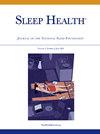Impact of environmental and lifestyle factors on adolescent sleep health in urban and semiurban areas
IF 3.4
2区 医学
Q2 CLINICAL NEUROLOGY
引用次数: 0
Abstract
Objectives
This study examines the impact of lifestyle factors on adolescent sleep health across urban and semiurban settings.
Methods
A cross-sectional survey was conducted among 1459 adolescents aged 14-19 years from Tabriz (urban) and Hadishahr (semiurban), two cities with contrasting environmental conditions. Sleep duration and sleep deprivation were assessed using self-reported data, alongside key sociodemographic, behavioral, and health-related factors.
Results
The results showed that adolescents in urban area were significantly more likely to experience shorter sleep durations (OR = 0.63, 95% CI [0.48, 0.83]) and sleep deprivation (OR = 0.66, 95% CI [0.51, 0.85]) compared to those in semiurban environments. Age was positively associated with short sleep (OR = 1.21, 95% CI [1.07, 1.38]), while smoking (OR = 1.46, 95% CI [1.02, 2.08]) and chronic cough (OR = 1.35, 95% CI [1.01, 1.80]) were also linked to reduced sleep duration. In contrast, semiurban residents slept an average of 20 minutes longer than urban residents (β = 0.34, 95% CI [0.17, 0.51]). Sleep deprivation was strongly associated with lower Parent’s income (OR = 0.78, 95% CI [0.61, 0.98]) and daytime fatigue (OR = 1.58, 95% CI [1.26, 2.00]).
Conclusions
The study highlights the need for public health interventions that address environmental barriers to healthy sleep, particularly in urban settings, to mitigate the long-term health risks associated with sleep deprivation.
城市和半城市地区环境和生活方式因素对青少年睡眠健康的影响
目的:本研究考察了生活方式因素对城市和半城市青少年睡眠健康的影响。方法:采用横断面调查方法,对来自大不里士(城市)和哈迪沙赫尔(半城市)两个环境条件截然不同的城市1459名14-19岁青少年进行调查。使用自我报告的数据以及关键的社会人口、行为和健康相关因素来评估睡眠时间和睡眠剥夺。结果:结果表明,与半城市环境中的青少年相比,城市地区的青少年更有可能经历较短的睡眠时间(OR=0.63, 95% CI[0.48, 0.83])和睡眠剥夺(OR=0.66, 95% CI[0.51, 0.85])。年龄与睡眠不足呈正相关(OR=1.21, 95% CI[1.07, 1.38]),而吸烟(OR=1.46, 95% CI[1.02, 2.08])和慢性咳嗽(OR=1.35, 95% CI[1.01, 1.80])也与睡眠时间减少有关。相比之下,半城市居民比城市居民平均多睡20分钟(β=0.34, 95% CI[0.17, 0.51])。睡眠剥夺与父母收入较低(OR=0.78, 95% CI[0.61, 0.98])和白天疲劳(OR=1.58, 95% CI[1.26, 2.00])密切相关。结论:该研究强调需要采取公共卫生干预措施,解决健康睡眠的环境障碍,特别是在城市环境中,以减轻与睡眠剥夺相关的长期健康风险。
本文章由计算机程序翻译,如有差异,请以英文原文为准。
求助全文
约1分钟内获得全文
求助全文
来源期刊

Sleep Health
CLINICAL NEUROLOGY-
CiteScore
6.30
自引率
9.80%
发文量
114
审稿时长
54 days
期刊介绍:
Sleep Health Journal of the National Sleep Foundation is a multidisciplinary journal that explores sleep''s role in population health and elucidates the social science perspective on sleep and health. Aligned with the National Sleep Foundation''s global authoritative, evidence-based voice for sleep health, the journal serves as the foremost publication for manuscripts that advance the sleep health of all members of society.The scope of the journal extends across diverse sleep-related fields, including anthropology, education, health services research, human development, international health, law, mental health, nursing, nutrition, psychology, public health, public policy, fatigue management, transportation, social work, and sociology. The journal welcomes original research articles, review articles, brief reports, special articles, letters to the editor, editorials, and commentaries.
 求助内容:
求助内容: 应助结果提醒方式:
应助结果提醒方式:


